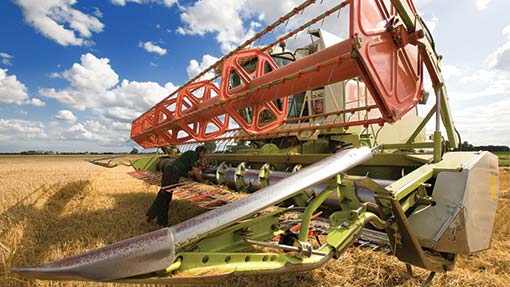Tips on planning for Basic Payment Scheme and greening rules

This round of CAP reform may not feel like too big a deal for farmers in England, but there are changes afoot that could have a significant effect on the arable sector.
Producers involved in specialist cropping, contract farming, block-cropping or diversification may need to take a step back and consider how things are best structured to ensure compliance with the new rules.
Diversification
Being a farmer with non-farming interests does not of itself put you at risk from the “active farmer” test. Only businesses that operate so-called negative list enterprises are caught. Those enterprises are airports, railway services, waterworks, real estate services, permanent sports and recreational grounds.
 Julie Robinson
Julie RobinsonPartner
Roythornes Solicitors
The latest guidance from the European Commission says that, as far as “real estate services” are concerned, it does not consider farmers who let out farm cottages on their farms as falling into this category. The target is property developers and estate agents.
If your business does fall into one of the negative list categories, you will have to jump through one of three hoops to qualify as an active farmer. Two of these are admin-heavy income-related tests, but the third – demonstrating that agriculture is a principal object of the business – should be more manageable for businesses that have farming at their core. We await further details from Defra about what evidence will be needed.
Specialist cropping
Changes introduced with the Single Payment Scheme (SPS) in 2005 meant specialist crop growers who depend on taking arable land on rotation from other farmers could no longer ignore the effects of farm subsidies. That remains the case under the new Basic Payment Scheme (BPS), but greening rules add an additional layer of complexity to arrangements.
What used to be done on a handshake now needs to be documented. Parties need to make sure the agreement not only passes muster with the RPA inspector (for example, with regards to responsibility for cross-compliance and any environmental stewardship), but that it works between the parties. It is a commercial agreement, not simply a box-ticking exercise. At the very least it needs to set out what must be done and when, who is responsible for what and what happens when things go wrong.
Broadly speaking, farmers and specialist croppers have four basic options:
- A farm business tenancy
- A contracting agreement
- A cropping licence
- A share-farming arrangement.
The new definition of farmer under the BPS is helpful. As well as someone who grows crops, a farmer is someone who keeps land “in a state that is suitable for grazing or cultivation without preparatory action going beyond usual agricultural methods and machineries.” We are still waiting for final details from Defra, but most arable farmers who have crops on their land should be able to fulfil that secondary definition.
The table below gives further information about each of the options.
JVs, contracting agreements and the three-crop rule
One of the biggest concerns voiced by arable farmers is how greening will affect holdings that are contract-farmed but fall just above the three-crop threshold. Equally, farmers who set up joint ventures to increase efficiency by block-cropping their farms are concerned about how to maintain that efficiency if each separate farm has to grow three crops again.
Share-farming may be a way forward. It will not work in every circumstance, but for some it will make more sense for the business that bears the greater part of the responsibility for managing greening features to be the BPS and greening payment claimant.
If there is a clampdown on dual claims from next year, parties will need to take care not to fall foul of the new rules. Defra is expected to make an announcement later this year.
Points to watch
- Entitlement transfer deadlines – the first of these, with transfers governed by the current SPS rules, is midnight on 19 October 2014. Any 2015 transfers will be subject to the new BPS rules, including its active farmer provisions.
- Changes to eligible land definitions – watch in particular the distinction between arable and permanent crops for the purposes of calculating greening obligations. Some crops originally excluded from the permanent crop definition for SPS purposes now fall under the permanent crop heading (for example asparagus, raspberries, artichokes).
- Non-agricultural use rules – as under the present regime, land that supports a claim has to be eligible for the full scheme year, but with an allowance for an element of non-agricultural use as long as the area is predominantly used for agricultural activities. Defra has indicated the rules are likely to be similar to what we have now.
- Principal objects of your business – if your business operates any of the “negative list” enterprises, but agriculture is a principal object of the business, make sure official documents say that (for example, company objects /VAT registration/annual accounts).
- Distinction between BPS and greening – one for the professionals, but BPS and greening are two separate payment schemes and both need to be addressed in contracting, tenancy and land sale/purchase agreements.
| Effect of business agreements on claims | ||
|---|---|---|
| Type of arrangement | Who claims BPS and greening payment? | Additional comments |
| Farm business tenancy (where tenant actively carries out the farming operations) | Tenant | Landlord does not manage the land; it is not part of his holding. (A “holding” for CAP purposes is the total of the units used for agricultural activities that a farm business manages) |
| Contracting agreement (parties are the farmer contractor) | Farmer | The land does not form part of the contractor’s holding; he carries out the cultivations under a contract for service and under the direction of the farmer. The crop may or may not be purchased by the contractor following harvest |
| Cropping licence (parties are the licenser and the licensee) | Licenser (farmer) | The licenser is a farmer carrying out agricultural activity on his holding. He allows the licensee to carry out specified agricultural activity (cultivations) on the holding subject to certain conditions (for example, growing a crop in line with the licenser’s farm management plan and in a way that respects the rules of the BPS and greening measures adopted by the licenser). |
| Share-farming (parties are share-farmer (1) and share-farmer (2)) | Parties decide | Under a share-farming agreement both parties run their own farming business on who claims the land and both qualify as farmers for BPS purposes. Only one of them can make the BPS claim and the land covered by the agreement must be included on that farmer’s application |
